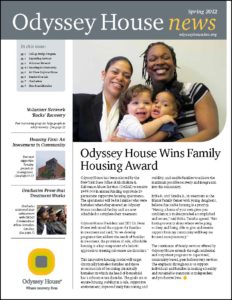Alcoholism & Drug Abuse Weekly
In a development that so far is seen mainly as benefiting treatment centers that traditionally work with the neediest clients, a growing number of addiction treatment facilities are gaining direct expertise as providers of permanent housing for individuals and families with substance use issues.
These facilities are finding that helping to meet clients’ housing needs can assist in building a stronger, more long-term relationship with these individuals, while also being potentially attractive to funders that are increasingly seeing unmet housing needs as a critical barrier to long-term recovery for persons with substance use disorders.
“Branching out into areas such as housing has completely transformed our agency from a specialty health provider to a multiservice provider capable of meeting the multiple needs of our clients,” Mark Hurwitz, CEO of Palladia, Inc. in New York City, told ADAW. “Housing is a major determinant of public health.”
Palladia in 2012 became one of five New York City treatment organizations to receive an initial round of funding under an Office of Alcoholism and Substance Abuse Services (OASAS) initiative to establish permanent supportive housing for families in which the head of household has a substance use disorder (see ADAW, Feb. 27, 2012). Later in the year, Palladia received a second housing grant from OASAS, under a separate housing initiative targeting high utilizers of Medicaid services such as individuals with numerous detox visits.
In all, Palladia now oversees nearly 450 units of permanent housing (some at sites it owns and the rest under scattered-site leasing arrangements), having been involved with various housing initiatives since the 1990s, said Hurwitz. Supportive housing under its control has allowed Palladia to see improvement in a situation where many of its clients were often caught in a revolving door of shelter and city jail stays.
“Many of the doctors who work with chronically ill individuals will say, ‘If I could write just one prescription, it would be for a unit of housing,’” Hurwitz said.
Assuming more control
Odyssey House was another of the five initial grantees under the OASAS housing initiative targeting families where the head of household has a substance use disorder (see ADAW, February 27, 2012). It now has received funding in two rounds of that program to secure a total of 35 apartments for families, said president and CEO Peter Provet, Ph.D.
Provet told ADAW that he believes addiction treatment agencies’ work in the permanent housing area can be successfully structured in more than one way — in fact, Odyssey House has looked into the possibility of entering a partnership venture with a housing developer in which it would lease units directly from the developer. But he does see advantages to a treatment agency building its own in-house expertise in fulfilling clients’ housing needs.
“In general, when you’re dealing with drug addiction, the more control you have, the better,” Provet said. “The addict has a way of splitting [service] systems; it’s part of the disease of addiction. The more agencies that are in the mix, the more complicated it gets to prevent that type of behavior.”
Like Palladia, Odyssey House now has a lengthy history of involvement with housing programs, having cut its teeth in this area via capital development grants from the state Office of Mental Health (OMH). Among its current projects, it is building two new housing facilities in the Bronx that each will serve 60 individuals with serious mental illness.
The OASAS project for which Odyssey House has secured funding for 35 apartment units targets chronically homeless families — Provet says those who benefit from the program are required to have been homeless for at least one year in the past two years.
Odyssey House and the other grantees under the program provide case management and wraparound services to clients; it is not a requirement of the grant program that grantees be delivering direct treatment services to clients that are receiving the housing. Clients are required to contribute a portion of their earnings/benefits toward rent.
Provet said that while it is important to recognize the importance of housing to a stable recovery, he believes the addiction treatment field must guard against buying into the assumption that secure housing and wraparound services alone will suffice for every individual.
“We don’t want to replace treatment with housing,” Provet said. “Housing is not treatment. In the past, some thought long-term residential was for everyone, and now we need as a field to be mindful of this pendulum swinging in the other direction. Housing with wraparound services makes sense for many, but not for all.”
Palladia’s Hurwitz is finding that payers and providers are generally shifting their thinking from seeing the treatment experience as a separation of patients from the community toward a vision of seeing treatment integrated into the community with a variety of social supports. In its staff’s being able to address a wider variety of the interconnected issues that can contribute to poor outcomes, Palladia “helps [clients] have a long-term trusting relationship with us through our staff, who can connect them with services and people,” Hurwitz said.
Public vs. private
To this point, it appears that direct involvement in permanent housing initiatives has captured more attention among treatment facilities that largely serve a lower-income population. Michael Walsh, president and CEO of the National Association of Addiction Treatment Providers (NAATP), told ADAW that he hasn’t heard of any NAATP member organizations moving to develop permanent housing for clients they’re serving.
Yet he added that he believes this could become part of more treatment centers’ plans in the future, for two reasons: because it would allow facilities to keep in closer contact with clients and therefore do a better job of tracking long-term outcomes, and because it is possible that permanent housing might ultimately generate less opposition from local communities.
Provet brought up another interesting twist to the discussion of permanent housing on the public-sector side. With the OASAS initiative for families targeting the homeless, one question that has arisen involves whether time spent in residential treatment for addiction should be considered a period of homelessness. Provet said his organization would interpret that period as being part of the homelessness stage, but he added that state and city regulations in New York appear to argue otherwise. •





